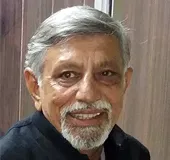-
CENTRES
Progammes & Centres
Location
The Pakistan army has commenced openly supporting internal religious and fundamentalist groups. If these parties rise to power, Pakistan’s internal dynamics could rapidly change.

The recently concluded protest by the members of the Tehreek Labaik Ya Rasool Allah (TLYRA), led by Khadim Hussain Rizvi in Islamabad ended with the army brokering a peace deal, almost three weeks after it commenced and held the city to ransom. Post the orders of the Islamabad High Court, the government was compelled to employ force to dislodge the protestors. It deployed about 8,000 police and rangers for this action, but it failed, leaving six dead and scores wounded. The operation was ill planned and uncoordinated from the start.
Even before the police action was launched, the Director General of Pakistan’s Inter Services Public Relations tweeted that the army hoped that ‘both sides should show restraint,’ implying direct interference in matters beyond its scope. It also equated the state with the protestors. Post the blotched police action, the government officially called in the army to handle the situation.
The army accepted the government orders, but issued an official statement claiming, ‘while it is ready to act, a few points need deliberation.’ This implied that there were doubts in the minds of the army leadership on supporting the civilian government in its moment of crises. It never deployed, but directly went in to broker peace. Protest organiser Khadim Rizvi subsequently commented that the army had assured them that all their demands would be met.
It was evident that the army had openly supported the protestors, against the government, compelling the state to surrender. The final agreement had every demand of the protestors agreed to, including the resignation of a central minister, action against those who acted against them and dropping of all charges against those arrested. In fact, the final sentence in the agreement thanked the army chief for ‘saving the nation from a big catastrophe.’
It was evident that the army had openly supported the protestors, against the government, compelling the state to surrender. The final agreement had every demand of the protestors agreed to.
The agreement was also signed by a serving major general, a senior member of the ISI, on behalf of the army. Post the end of the protests, photographs emerged of the head of the Karachi Rangers, a major general, distributing thousand-rupee notes to the protestors, claiming it to be the bus fare home, but in actuality paying them for protesting.
The recent protest was almost a playback of the Lal Masjid episode of 2007. In the Lal Masjid episode, the state failed to act when the protests had initially commenced, almost 18 months before the launch of the military operations. When it finally did, it resulted in over a hundred deaths and the emergence of the TTP, the anti-Pak Taliban. Similarly, in the present protest, in the initial phases there were only a few hundred protestors. Had the state acted, it could have easily controlled the situation.
Opposition political parties, like in any other democracy, began taking advantage of the protest, seeking to corner the government, impacting on its decision making. They pledged support to the protestors, giving the agitation more power than it deserved. They failed to realise that they were playing into the hands of the army, which is seeking to change the political landscape for the future.
Support to terror groups operating in Kashmir and Afghanistan by the deep state has been well established. Its desperation to place a pro-Pakistan government in Kabul and continue engaging the Indian army in Kashmir has led it to being treated shabbily by the US and ignored by India. Hence, all demands for talks are not even responded to, by India. Nawaz Sharif, former prime minister, attempted to change this narrative and is facing possible time behind bars.
In a turn of events, the Pakistan army has also commenced openly supporting internal religious and fundamentalist groups, turning screws on main political parties and threatening the future of the country. If these parties rise to power, Pakistan’s internal dynamics could rapidly change. It would no longer be a nation dependable or trustworthy, but dangerous and isolated, even for the international community.
In a turn of events, the Pakistan army has also commenced openly supporting internal religious and fundamentalist groups, turning screws on main political parties and threatening the future of the country.
Its open support to TLYRA in this protest and to Hafiz Saeed in forming his political party, Milli Muslim League, bears the testimony. The announcement over the weekend by Hafiz Saeed on contesting the next elections is with the blessings of the army. The government denied permission for the registration of Hafiz’s party prior to the last by-election, but would be unable to do so in the future, due to open army backing.
TLYRA, which led the protests, is an Islamist political party, formed in 2015, seeking to convert the country into an Islamic state. Their sudden rise to power is bringing into Pakistan a dangerous mix of religion and politics. The filthy language used by their leader in his fiery speeches invokes emotional appeal amongst the poorly educated masses, inciting them to violence. This was also adversely commented upon by Pakistan’s Supreme Court, but surely would have no impact. Its emergence as a national political force, supported by the army, will divide the nation along sectarian lines and enhance internal instability.
The leaders of Pakistan’s religious and fundamentalist organisations have been spitting venom against present leading political parties, thus enraging local public against them and reducing their support base. It was being done by Rizvi throughout his agitation and by Hafiz Saeed immediately after his release. These parties seek imposition of Sharia and strong blasphemy laws, which has local backing from the lesser educated masses. Of the main political parties, the Pakistan Muslim League (PML) is already losing ground, post the removal of its leader Nawaz Sharif and the Pakistan People’s Party (PPP) has yet to regain its earlier standing.
With army backing, these fundamentalist groups would soon begin to overshadow main stream political parties and dominate politics in Pakistan. Doors which were closed to them, would now open, popularity would increase and being fiery speakers, masses would rally in support.
A fundamentalist or Islamist government, backed by an army which detests the polity, heading a volatile nuclear power, increases internal stability and insecurity, while adding to international tensions. The country could head the way of Iran or North Korea, both dangerous for the region. Simultaneously, the army would have a free run to pursue its external anti-neighbourhood policies and internal ethnic cleansing in the troubled regions of Baluchistan and Pakistan Occupied Kashmir (POK). It would also impact Indo-Pak relations adversely and enhance Indian threat perceptions in multiple ways.
Pakistan could head the way of Iran or North Korea, both dangerous for the region.
Internally, within Pakistan, there would be greater resistance in the regions along its western borders. Hence anti-Pakistan terror groups could become more active along the Pak-Afghan borders, while the Baluchistan freedom struggle would gather momentum. There is likely to be an increase in the sectarian violence and elimination of minorities which could lead to a greater internal divide. Economically, Pakistan would go on a downslide.
Internationally, with Islamists and fundamentalists dominating government, concerns on the assured security of Pakistan’s nuclear assets would increase. The US could find little support from Pakistan in curbing terror groups operating in Afghanistan. China, which has invested immensely in Pakistan for the construction of the CPEC and in various other industrial parks, may find the going tough. Internal instability, increased violence and a volatile environment may result in uncertainty, threatening the stability of the CPEC and deny China from obtaining suitable returns from its investments.
With strong anti-India elements, adopting a hard-line approach, being power brokers in the country, there would only be increased threats to India, both in Kashmir and across the country. The Pakistan army would become more radicalised and hence more unpredictable. So, the ceasefire violations should be expected to increase. There would be no demands for talks or peace, while giving the deep state the leeway it would desire for operating in Kashmir. Increased infiltration in Kashmir could be attempted alongside seeking to woo Kashmiris by promises of a pure Muslim state, which could increase internal violence. India should, therefore, be prepared for greater tensions and violence in the period ahead, if the deep state succeeds in its aims. The subcontinent would also become very unstable, impacting the region as a whole.
The views expressed above belong to the author(s). ORF research and analyses now available on Telegram! Click here to access our curated content — blogs, longforms and interviews.

An alumnus of the National Defence Academy Major General Harsha Kakar is a graduate of the DSSC LDMC and the National Securities Studies Course at ...
Read More +